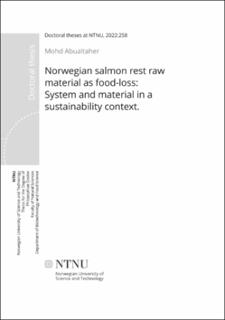| dc.contributor.advisor | Bar, Eirin Marie Skjøndal | |
| dc.contributor.advisor | Rustad, Turid | |
| dc.contributor.author | Abualtaher, Mohd | |
| dc.date.accessioned | 2022-09-15T10:14:05Z | |
| dc.date.available | 2022-09-15T10:14:05Z | |
| dc.date.issued | 2022 | |
| dc.identifier.isbn | 978-82-326-5615-8 | |
| dc.identifier.issn | 2703-8084 | |
| dc.identifier.uri | https://hdl.handle.net/11250/3017986 | |
| dc.description.abstract | The necessity for transformation of the food systems toward sustainability is a point of scientific consensus. At the core of the quested transformation falls the concept of optimizing biomass utilization efficiency. There is a global need for more food, to meet the nutritional needs of a steadily growing population and to counter global environmental challenges. Norwegian salmon farming is a globally significant seafood production system; imports raw material for salmon feed from multiple countries and exports the salmon product to more than 80 countries. Post-harvest processing of the salmon results in huge quantities of rest raw material. The main aim of this thesis is to define a scheme for optimum utilization of salmon rest raw material within the human food system. To achieve this target, this thesis develops and applies a novel interdisciplinary approach, that combines systems engineering, material flow analysis and the Sustainable development goals (SDGs) framework. This approach resulted in four papers where each one of them provided insight on a concept of systemic transition to sustainable rest raw material usage. Paper I provides an understanding for the role of material flow analysis studies in developing a sustainable salmon value chain, describing, and validating the relation between material management and sustainability. Paper II explores salmon production system structure and decision-making dynamics in relation to the post-harvest processing byproducts usage. Redefining the salmon rest raw material as industrial food-loss creates the connection with the food-loss reduction target in UN SDGs framework. Moreover, system’s performance and practices were studied under the shadows of sustainability and food security. Paper III came up with a novel method for food-loss assessment at operational level, through a systemic protein inventory for the Norwegian salmon value chain starting from the input of raw material as salmon-feed to the output of salmon products and rest raw material. Paper IV focused on verifying the systemic integration of the UN sustainable development goals within the Norwegian salmon value chain. This integration gives credibility to the proposition of SDGs as the sustainability context for system’s development. This research reveals the embodied motives within the Norwegian salmon value chain to develop measures for food-loss reduction. The thesis established an understanding for salmon rest raw material utilization as an industrial food-loss, introduced a customized method for its assessment and anchored it with the sustainable development goals framework that the system is committed-to. | en_US |
| dc.language.iso | eng | en_US |
| dc.publisher | NTNU | en_US |
| dc.relation.ispartofseries | Doctoral theses at NTNU;2022:258 | |
| dc.relation.haspart | Paper 1: Abualtaher, Moh'd Hasan Moh'd; Bar, Eirin Marie Skjøndal. Review of applying material flow analysis-based studies for a sustainable Norwegian Salmon aquaculture industry. Journal of Applied Aquaculture 2019 ;Volum 32.(1) s. 1-15 https://doi.org/10.1080/10454438.2019.1670769 This is an Open Access article distributed under the terms of the Creative Commons Attribution-NonCommercial-NoDerivatives License (CC BY-NC-ND 4.0) | en_US |
| dc.relation.haspart | Paper 2: Abualtaher, Moh'd Hasan Moh'd; Bar, Eirin Marie Skjøndal. Systems engineering approach to food loss reduction in Norwegian farmed salmon Post-harvest processing. Systems 2020 ;Volum 8. https://doi.org/10.3390/systems8010004 This is an open access article distributed under the Creative Commons Attribution License (CC BY 4.0) | en_US |
| dc.relation.haspart | Paper 3: Abualtaher, Moh'd Hasan Moh'd; Bar, Eirin Marie Skjøndal. Food-Loss Control at the Macronutrient Level: Protein Inventory for the Norwegian Farmed Salmon Production System. Foods 2020 ;Volum 9. https://doi.org/10.3390/foods9081095 This is an open access article distributed under the Creative Commons Attribution License (CC BY 4.0) | en_US |
| dc.relation.haspart | Paper 4: Abualtaher, Moh'd Hasan Moh'd; Rustad, Turid; Bar, Eirin Marie Skjøndal. Systemic Insights on the Integration of UN Sustainable Development Goals within the Norwegian Salmon Value Chain. Applied Sciences 2021 ;Volum 11.(24) https://doi.org/10.3390/app112412042 This is an open access article distributed under the Creative Commons Attribution License (CC BY 4.0) | en_US |
| dc.title | Norwegian salmon rest raw material as food-loss: System and material in a sustainability context. | en_US |
| dc.type | Doctoral thesis | en_US |
| dc.subject.nsi | VDP::Technology: 500::Food science and technology: 600 | en_US |
